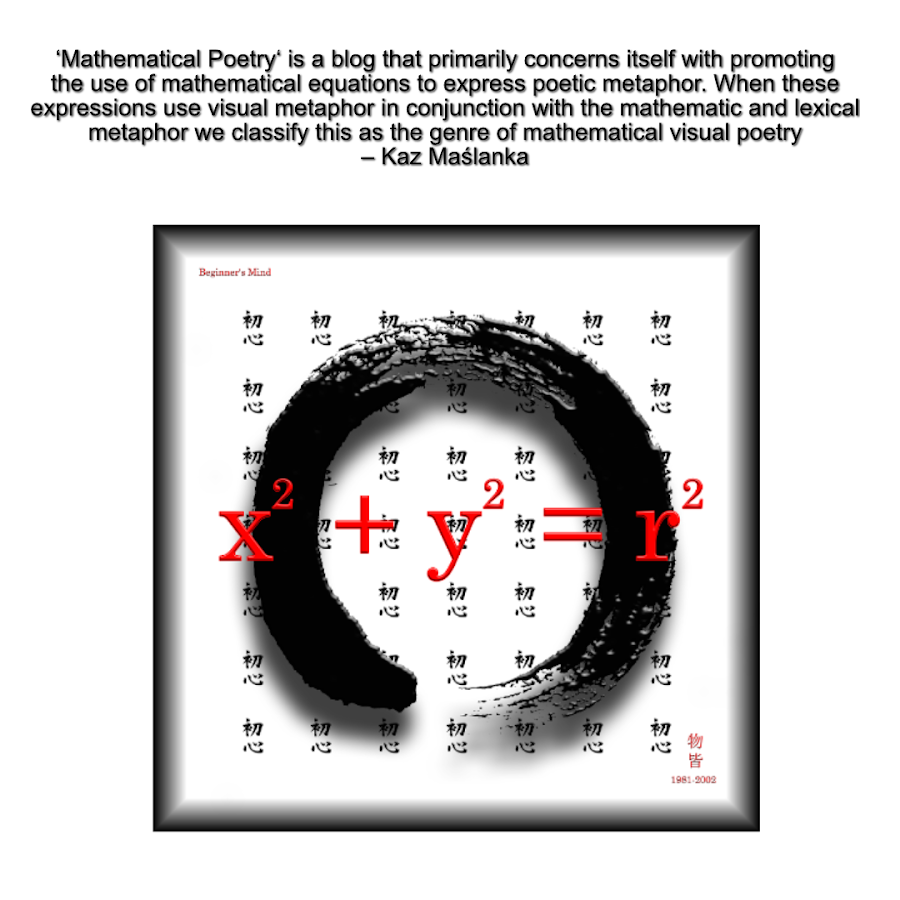Bob Grumman expresses what he calls True Mathematical Poetry
I also agree with his assessment about number poetry … to me the beauty of number poetry IS the beauty of mathematics. Sure it has rhythm in it but so does virtually everything that the mind can remember due to memory's existence being dependent of repetition. And sure it can be visualized but does visualizing something make it art? Once again I will express that I think art is an expression of culture and ‘Pure Mathematics’ is cultureless.
VizPo-Central has left a new comment on your post "Four Types of Mathematical Poetry":
Number poetry gives one an appreciation of pure math but doesn't seem to me to be poetry. Appreciation of it takes place in one's mathematical awareness only, it seems to me.
The more I think about it, the less I know what to call it. It's not visimagery (i.e., visual art). I guess I would call it number art--it's numbers arranged in order to elicit mathematical pleasure. It's not a kind of mathematical poetry, but an equal art.
As for who "dominates" the term, "mathematical poetry," I say let there be competition; let all who want to define it have their say, and hope that reason prevails. What usually happens in picking terms for kinds of art is what has happened with the term, "postmodernism." A catchy worthless term is coined, probably by an ignorant academic, and someone even more ignorant but with a lot of readers makes it fashionable, and the morons run with it before people of intelligence have had a chance to analyze it and perhaps find a better term.
I will admit that my definition of mathematical poetry fits the kind of math-related poems I compose. So what? What matters is not whether my self-interest is involved, but whether the definition is effective or not.
Aside from what I'm calling "number art," it seems to me there are three kinds of math-related poetry: poetry that is about math, poetry that is generated by some kind of mathematical formula (like make a poem out of every third word in a given dictionary, and poetry in which some mathematical operation is aesthetically central.
I don't think poetry about math should be considered poetry because, to make it simple: poetry about chemistry is not called "chemical poetry," poetry about Bach would not be called "musical poetry," poetry about Picasso's paintings would not be called "visual poetry," poetry about Maria Tallchief would not be called "choreographical poetry," and so forth.
Similarly, mathematically-generated poetry (like sonnets, which are generated in part by the rule that they be ten by fourteen unit rectangles, or that kind of poem each of whose lines has a number of words in it equal to the sum of the number of words in the preceding two lines, or whatever it is) are no more mathematical poems than a bridge of building is a mathematical bridge or mathematical building because generated in part by mathematics. The end product is not mathematical.
Sorry about the slip up regarding "mathematical visual poetry," and I do see the difference. I wasn't able to type my post and read your entry at the same time, and forgot your designation. Anyway, my opinion remains the same: a visual poem that has mathematical symbols in it that don't carry out any mathematical operations is simply a visual poem with mathematical content.
I agree that my long division poems are equational. But some of my other math-related poems are just terms, Like one that is just an ampersand with an exponent of three. "Andness" multiplied by itself twice. I suppose you could call it an equation, half of which is implied.
Yes, I'm sure our little controversies will disappear into some void or other--"exiled history" sounds okay. Better than "non-history."
all best, Bob






























